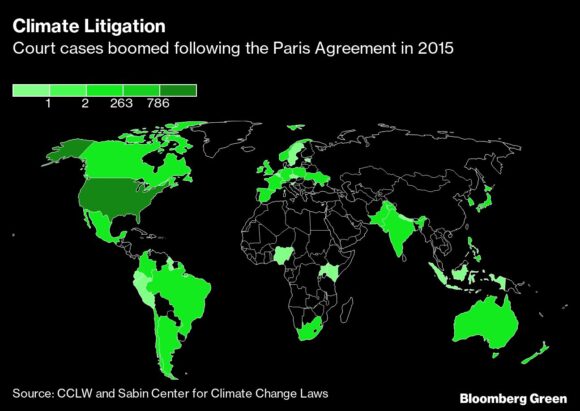Marjan Minnesma cheered along with her fellow climate activists in May when a judge ordered Royal Dutch Shell Plc to drastically slash its carbon-dioxide emissions. It was the first time a company had been held legally accountable for its planet-warming pollution.
It wasn’t the first time Minnesma had celebrated a groundbreaking legal victory handed down in that court building in The Hague, Netherlands. Six years ago, her non-governmental organization Urgenda sued the country’s leaders for failing to cut pollution quickly enough to avoid catastrophic global warming. A judge agreed that protecting the environment was a human right and told the government to cut emissions 25% from 1990 levels by 2020.
The win was a watershed moment — since then, similar decisions were made all over the world, by high courts ranging from Germany’s to Pakistan’s. But Minnesma isn’t satisfied with how the verdict was enforced. The Netherlands came close to meeting the 25% target last year, with emissions dropping about 24.5% due to coronavirus-induced lockdowns, yet Minnesma says no structural changes have been made to keep CO₂ below the threshold. Urgenda estimates that emissions for the first half of this year were 4.4 million tons higher than the same period in 2020.
After it won the 2015 case, Urgenda presented the government with a list of 54 policies it could potentially use to meet the emissions target, ranging from reducing the country’s livestock herd to greening rooftops. Still, the group says not enough was done to fulfill the verdict, which was confirmed by the Dutch Supreme Court in 2019. While the government did shut a coal plant, it remains locked in disagreements over compensation with companies that operate four other facilities that are supposed to close by 2030.
Minnesma’s experience underscores the complexities of enforcing these verdicts once they’re handed down. It’s a question that hangs over the Shell case, as well. The company plans to appeal the decision and it could take years to see tangible results in lowering emissions.
Donald Pols, director of Milieudefensie, the Dutch arm of Friends of the Earth that brought the case against the oil giant, said the effectiveness of the ruling that “will decide if we can stop climate change.” Milieudefensie is closely watching how Urgenda strategizes to get its verdict enforced, Pols said. “We have to be stricter when it comes to the execution of the verdict and will be quicker to take action when signals surface that the execution is slacking.”

Other activists are looking to Urgenda for leadership, too. NGOs in Belgium, Ireland, Australia, Germany, France, Nepal, Colombia and Pakistan have all followed the group’s playbook to win cases against their governments. New suits were filed in the Czech Republic, Poland and Italy this year. Apart from the Paris Agreement, Urgenda’s work is the biggest reason for the explosion of climate cases that have been filed since 2015, according to the London School of Economics’ Grantham Research Institute on Climate Change and the Environment. The group says at least 37 “Urgenda-style” cases have been brought since 2015.
Like Urgenda, Milieudefensie is exporting its winning strategy abroad, acting as matchmakers between financial donors and other NGOs working on similar cases. Pols will soon start training the British arm of Friends of the Earth, who are considering a case against BP Plc. French Oil giant TotalEnergies SE faces a case brought by lawyers with access to Milieudefensie’s know-how.
Frustrated with what she sees as a lack of progress, Minnesmais preparing to take the government of the Netherlands back to court. There’s no other option after “years of talking and seeking cooperation,” she said, sitting in her office in a former school building in Zaandam, near Amsterdam. The government is choosing to “hollow out its foundation of rule of law” by not adhering to the verdict. “You expect a government like the Netherlands to abide by the verdict of a judge,” Minnesma said.
In 2019, the Dutch government laid out a plan to cut emissions 49% by 2030. The Netherlands Environmental Assessment Agency, a body that advises the state on environmental issues, concluded in October that current policies will only produce a 34% decrease by the end of the decade. “We’re looking to see what we can do this year, but it is extremely difficult,” said Prime Minister Mark Rutte in an interview this month.
Should she decide to sue, Minnesma plans to ask for a financial penalty for failing to obey the 2015 verdict. Legal specialists have told her the payout could be anywhere from 100 million euros ($118 million) to 2 billion euros, but they’re all guessing. There’s no precedent.
And it might be wishful thinking. It’s unlikely Minnesma would be able win such a large award, says Eric de Brabandere, professor of international dispute settlements at Leiden University. “Can a judge justify to the Dutch people giving 1 billion euros to an NGO? That is disproportionally big,” he said. “I do not think a judge will grant a number over 100 million euros.”
Minnesma says the money would go into a fund dedicated to cutting emissions. It could be used, for example, to finance decarbonization efforts outside the scope of government aid, such as installing rooftop solar panels for the poor.
In the meantime, the government is hoping to keep talks going. “We have excellent discussions with her,” Rutte said of Minnesma.
Minnesma, in turn, said she hasn’t spoken to Rutte since she began talking publicly about going back to court. The prime minister declined to go into details of the court case.

Photo credit: Peter Boer/Bloomberg.
Pols thinks the Shell verdict will be easier to enforce than the ruling against the Dutch government. “A big difference between companies and governments are the checks and balances,” he said. “Politicians are evaluated once every four years. For a company, this happens on a yearly basis. CEOs have to justify all risks they take, euros they spend, and once a year an accountant reports on the climate policy.”
Shareholders also have the tools to intervene more directly, he said, and they will play an important role in the enforcement process. Pols says he’s started having conversations with the heads of other big polluters in the Netherlands, including the chief executive officer of Tata Steel’s Dutch operations, about what they can do to avoid being similarly targeted.
Whether Shell’s shareholders push the company to do more depends on how public opinion changes, says Rutger Claassen, a professor of economic ethics at Utrecht University. Before the ruling, 89% of the company’s shareholders voted in favor of its energy transition strategy while less than a third backed a resolution for more stringent targets to reduce emissions. But more extreme weather all over the world and increased government action, which could potentially get a high-profile boost at global climate talks in November, could push investors to do more. “Shell’s position will depend on these developments,” Claassen said.
Minnesma says she’d hoped to avoid a second lawsuit. Her desire was to work hand-in-hand with the government to develop policies to accelerate climate action. “Our case was successful because we deeply understand climate change and can translate it to the legal system,” she said. “Don’t go re-inventing the wheel on your own and save yourself years of work.”
But judges seem to better grasp the urgency of the climate challenge than politicians, Minnesma said. “I am not in a fight with the government,” she said. “I care about climate change and if another lawsuit can help me, great.”
–With assistance from Fred Pals and Laura Hurst.
Photograph: Climate activist Marjan Minnesma. Photo credit: Peter Boer/Bloomberg.
Was this article valuable?
Here are more articles you may enjoy.

 Bayer to Make $10.5 Billion Push to Settle Roundup Cases
Bayer to Make $10.5 Billion Push to Settle Roundup Cases  NYC Travel Snarled by Snow as Central Park Gets 15 Inches
NYC Travel Snarled by Snow as Central Park Gets 15 Inches  AIG’s Zaffino: Outcomes From AI Use Went From ‘Aspirational’ to ‘Beyond Expectations’
AIG’s Zaffino: Outcomes From AI Use Went From ‘Aspirational’ to ‘Beyond Expectations’  Walmart to Pay $100 Million to Settle FTC Case on Driver Wages
Walmart to Pay $100 Million to Settle FTC Case on Driver Wages 